
Southeastern Geographer
Scope & Guideline
Empowering Scholars to Understand Our Planet
Introduction
Aims and Scopes
- Urban Geography and Planning:
The journal frequently addresses themes related to urban development, infrastructure, and transportation planning, reflecting the complexities of urbanization in southeastern cities. - Environmental Geography and Climate Change:
Research articles often explore the impacts of climate change and environmental management strategies, particularly in relation to coastal regions and natural resource conservation. - Social Justice and Inequality:
A consistent focus on issues of race, class, and social justice is prevalent, with studies examining the socio-spatial dynamics of marginalized communities and the historical context of these disparities. - Cultural and Historical Geography:
The journal includes analyses of cultural landscapes and historical narratives, providing insights into how history shapes contemporary geographic identities and practices. - Ecological Studies and Conservation:
Research on biodiversity, ecological restoration, and conservation efforts in the southeastern U.S. contributes to understanding the region's natural heritage and environmental challenges.
Trending and Emerging
- Climate Resilience and Adaptation:
There is a growing emphasis on climate resilience strategies, particularly in coastal regions, highlighting the need to address vulnerabilities and promote sustainable practices. - Social Vulnerability and Health Disparities:
An increase in studies examining social vulnerability, especially in the context of health outcomes during crises such as the COVID-19 pandemic, underscores the journal's commitment to addressing inequities. - Urban Equity and Transportation Justice:
Research focusing on transportation equity and urban planning is gaining traction, reflecting a broader dialogue on accessibility and the impacts of urban infrastructure on marginalized communities. - Cultural Geographies and Identity:
Emerging themes related to cultural geography, identity formation, and the representation of diverse communities are being explored, particularly in relation to race and ethnicity. - Technological Integration in Geography:
The use of advanced technologies, such as UAV imagery and GIS, is increasingly prevalent in research, demonstrating a trend towards integrating technology with geographical analysis.
Declining or Waning
- Traditional Economic Geography:
There has been a notable decrease in research that focuses explicitly on traditional economic geography, particularly studies centered on industrial development and economic growth metrics in the region. - Rural Geography:
Articles specifically addressing rural issues, such as agricultural practices or rural-urban migration patterns, seem to be less frequent compared to urban-focused studies. - Political Geography and Geopolitical Studies:
Research that delves into political geography and the geopolitics of the Southeastern U.S. has seen a reduction, possibly overshadowed by more pressing social and environmental concerns. - Historical Geographies of Slavery and Civil War,:
While still important, the volume of papers specifically addressing the historical geography of slavery and the Civil War appears to be waning, with fewer studies published in recent volumes.
Similar Journals
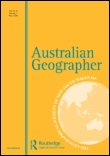
AUSTRALIAN GEOGRAPHER
Connecting Scholars Through Geographic InquiryAUSTRALIAN GEOGRAPHER, published by Routledge Journals, Taylor & Francis Ltd, is a leading scholarly journal that captures the dynamic and multifaceted field of geography. With an ISSN of 0004-9182 and an E-ISSN of 1465-3311, this peer-reviewed journal has a long-standing tradition, dating back to its origins between 1928 and 1929, and is essential for those engaged in cutting-edge research in Earth-Surface Processes and Geography, Planning and Development. Recognized for its academic rigor, the journal holds a prestigious Q1 ranking in both Earth-Surface Processes and Geography categories as of 2023. Furthermore, its Scopus rankings underscore its influence, placing it in the top 30% of its field. Although it does not currently offer Open Access, AUSTRALIAN GEOGRAPHER remains a critical platform for presenting significant geographic research and fostering academic dialogue, making it indispensable for researchers, professionals, and students eager to contribute to the evolving landscape of geographic scholarship.
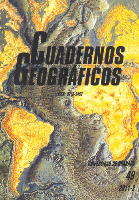
Cuadernos Geograficos
Fostering collaboration for a deeper understanding of geography.Cuadernos Geograficos is a distinguished open access journal published by UNIV GRANADA in Spain, dedicated to advancing the fields of geography, planning, and earth-surface processes. With an ISSN of 0210-5462 and E-ISSN 2340-0129, this journal has been serving as an essential platform for scholars since its inception in 1983. By providing rigorous peer-reviewed research, Cuadernos Geograficos contributes significantly to the academic discourse within these disciplines, holding a respectable position in the Q3 category for both Earth-Surface Processes and Geography, Planning, and Development as of 2023. The journal is indexed in Scopus, ranking #431/821 in Social Sciences and #100/179 in Earth and Planetary Sciences, affirming its relevance and impact within the scholarly community. With its commitment to open access since 1999, Cuadernos Geograficos ensures that vital research is accessible to a diverse audience of researchers, professionals, and students, fostering knowledge sharing and collaborative advancements in the geographical sciences.

Documents d Analisi Geografica
Exploring the Boundaries of Geography and KnowledgeDocuments d'Anàlisi Geogràfica is a distinguished academic journal published by Universitat Autònoma de Barcelona, focusing on the fields of geography, planning, and earth-surface processes since its inception in 1988. With an Open Access policy implemented in 2012, the journal aims to facilitate the widespread dissemination of geographical research and insights, accessible to a global audience. Currently ranked in Q3 for both Earth-Surface Processes and Geography, Planning and Development categories, it serves as a vital platform for researchers, practitioners, and students to share their findings and enhance knowledge in these critical fields. The journal is indexed in Scopus, where it stands at rank #470 in Social Sciences and #106 in Earth and Planetary Sciences, reflecting its growing impact in relevant academic communities. Based in Barcelona, Spain, Documents d'Anàlisi Geogràfica continues to contribute substantially to geographical scholarship by exploring contemporary issues and advancements in a rapidly evolving world.
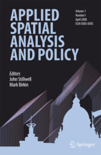
Applied Spatial Analysis and Policy
Shaping the future of spatial planning and development.Applied Spatial Analysis and Policy, published by Springer, is a leading journal dedicated to advancing knowledge in the field of spatial analysis and its application in policy-making. With an ISSN of 1874-463X and an E-ISSN of 1874-4621, this peer-reviewed journal has been at the forefront of geographical research since its inception in 2009 and continues to thrive with a convergence extending to 2024. As a recognized publication in the Geography, Planning and Development category, it holds a commendable Q2 quartile ranking for 2023 and is positioned at rank #238 out of 821 in the Scopus classification, reflecting its strong impact and relevance within the academic community with a percentile of 71. The journal provides a robust platform for researchers and professionals to explore innovative methodologies and empirical studies that enrich spatial policy frameworks. While access to individual articles is not open access, its significant contribution to the field makes it a vital resource for anyone involved in spatial analysis and related disciplines.
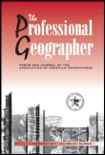
PROFESSIONAL GEOGRAPHER
Unveiling Insights in Geography and Earth-Surface ProcessesPROFESSIONAL GEOGRAPHER is a prominent journal in the fields of geography and earth-surface processes, published by Routledge Journals, Taylor & Francis Ltd. With a rich history dating back to 1949 and continuing through 2024, it serves as a vital platform for researchers, professionals, and students to explore and disseminate groundbreaking research and insights within the geographical sciences. The journal holds a respectable impact factor, placing it in the Q2 quartile for both Earth-Surface Processes and Geography, Planning and Development as of 2023, highlighting its importance in these critical academic areas. The journal ranks #273 out of 821 in Geography and Planning and #70 out of 179 in Earth and Planetary Sciences on Scopus, reflecting its robust contribution to advancing knowledge in social sciences. Although it does not currently offer open access options, it still provides invaluable content that influences pedagogy and research in geography. Its comprehensive scope invites a wide range of geospatial topics, encouraging interdisciplinary dialogue and collaboration across the global academic community.

Territorios
Fostering Scholarly Dialogue in Geography and DevelopmentTerritorios, an esteemed Open Access journal published by UNIV ROSARIO in Colombia since 1999, serves as a critical platform for the dissemination of knowledge in the fields of Geography, Urban Studies, and Development Planning. With an ISSN of 0123-8418 and an E-ISSN of 2215-7484, the journal has been recognized for its commitment to promoting rigorous research and innovative practices within its scope. In the 2023 evaluation, it achieved notable rankings, placing in the Q4 category in Geography, Planning and Development, and Q3 in Urban Studies, reflecting its growing impact in the social sciences. Although currently positioned in the lower percentiles, the journal plays an important role in amplifying diverse voices and perspectives, encouraging scholarly dialogue in an ever-evolving urban landscape. The address of the journal's home is found at PROGRAMA PSICOLOGIA, FAC MED, CARRERA 24 63 C-69 QUINTA DE MUTIS, BOGOTA, COLOMBIA. Researchers, professionals, and students seeking a comprehensive understanding of contemporary geographical issues and urban development trends will find Territorios to be an invaluable resource.

MITTEILUNGEN DER OSTERREICHISCHEN GEOGRAPHISCHEN GESELLSCHAFT
Charting New Territories in Geographical ResearchMITTEILUNGEN DER OSTERREICHISCHEN GEOGRAPHISCHEN GESELLSCHAFT, published by the Österreichische Geographische Gesellschaft, serves as a vital resource within the fields of Geography and Earth-Surface Processes. This journal, with the ISSN 0029-9138, offers a platform for scholarly articles that contribute to the understanding of geographical phenomena, particularly focusing on regional and environmental issues based in Austria since its establishment. Although lacking Open Access options, the journal maintains rigorous publication standards and has seen converged issues from 1978 to 2008, and from 2011 to 2018, alongside recent volumes from 2020 to 2023. As a Q4 ranked journal in the Scopus categories for Geography, Planning and Development, and Earth-Surface Processes, it is strategically positioned to support researchers, professionals, and students striving to enhance geographical knowledge. As such, MITTEILUNGEN DER OSTERREICHISCHEN GEOGRAPHISCHEN GESELLSCHAFT continues to foster geographical discourse and innovation, contributing significantly to the academic community.
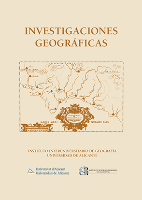
Investigaciones Geograficas-Spain
Championing empirical studies for impactful geographical solutions.Investigaciones Geográficas-Spain is an esteemed academic journal published by the Universidad de Alicante, dedicated to advancing the fields of geography, planning, and development as well as earth and planetary sciences. With its commitment to open access since 1983, the journal ensures that research is readily available to a global audience, facilitating knowledge dissemination and collaborative discourse. As reflected in its 2023 Scopus rankings, it holds a commendable position within the Q3 category in both Earth and Planetary Sciences and Geography, Planning and Development, making it a noteworthy resource for scholars and practitioners in these disciplines. The journal's scope encompasses diverse geographical research, aiming to address pressing environmental and societal challenges through empirical studies and theoretical advancements. By contributing to the knowledge reservoir from Spain and beyond, Investigaciones Geográficas-Spain serves as a vital platform for researchers, professionals, and students seeking to enrich their understanding of geographical phenomena.
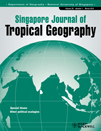
SINGAPORE JOURNAL OF TROPICAL GEOGRAPHY
Advancing Knowledge in Tropical GeographyThe Singapore Journal of Tropical Geography, published by Wiley, stands as a premier platform dedicated to the discourse on tropical geography, making significant contributions to the fields of Earth-Surface Processes and Geography, Planning, and Development. With an esteemed Q2 categorization in these areas, as per the 2023 rankings, this journal engages a diverse audience of researchers, professionals, and students committed to understanding the complex dynamics of tropical environments. Originating in 1980, the journal has maintained a consistent publication rhythm that extends through 2024, ensuring timely dissemination of cutting-edge research. Although not an open-access journal, it provides valuable insights and rigorous assessments that are beneficial to anyone involved in the study of geography and planetary sciences. Researchers looking for authoritative content will find the journal's robust rankings—ranked #205 out of 821 in Social Sciences and #54 out of 179 in Earth and Planetary Sciences—indicative of its impactful contribution to academia.

AREA
Shaping Tomorrow's Urban Landscapes Through ScholarshipAREA, with ISSN 0004-0894 and E-ISSN 1475-4762, is a premier open access journal published by Wiley since 2018, and situated in the heart of the United Kingdom. Recognized as a Q1 journal in Geography, Planning, and Development for 2023, it ranks impressively at #154 out of 821 in its category on Scopus, placing it in the 81st percentile. This esteemed journal, which has been a prominent venue for scholarly discourse since its inception in 1976, invites original research articles, reviews, and commentary that advance understanding and contribute significantly to the fields of geography and urban planning. As an open access journal, AREA ensures that high-quality research is readily available to a global audience, thus facilitating knowledge exchange and encouraging innovative approaches to geographical questions. Researchers, professionals, and students alike will find AREA to be an invaluable resource for cutting-edge insights and compelling discussions that shape the future of spatial analysis and environmental policy.